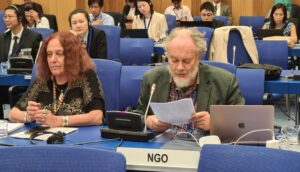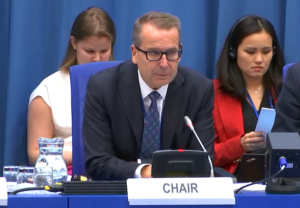Australia, a nuclear ally of the United States, should support the adoption of no-first-use (NFU) policies by the US and other nuclear-weapon states, and reject US options to start a nuclear war – including for the defense of Australia – according to representatives of a number of disarmament organisations that have endorsed a joint letter sent to Australian Prime Minister Scott Morrison on August 12, 2021.
‘It is profoundly in Australia’s interest to do what it can to decrease the risk of global or regional nuclear war,’ says John Hallam, Nuclear Disarmament Campaigner for People for Nuclear Disarmament and Australian Coordinator of Parliamentarians for Nuclear Nonproliferation and Disarmament (PNND). “Clinging to nuclear-war-initiating options simply prolongs and intensifies Australia’s exposure to nuclear war which poses a critical existential risk to Australia.”
The letter was prompted by ‘the growing risk of nuclear war, whether by deliberate intent, or (far more likely) via madness, miscalculation, malfunction, or malware’, which according to the endorsers ‘is recognised by the Australian Department of Foreign Affairs and Trade’ but about which the government adds fuel, rather than water, to the fire through its continued political and operational support for nuclear first strikes.
‘Through the ANZUS military alliance, Australia accepts extended nuclear deterrence from the USA,’ says international security expert Aaron Tovish, Executive Director of Zone Libre and a Steering Committee Member of NoFirstUse Global. ‘This currently includes the option of first-use of nuclear weapons in an armed conflict.’
Australian support for a US NFU policy could have significant political influence in the USA. Such support could, for example, give political weight to US legislative initiatives by Representative Adam Smith and Senator Elizabeth Warren promoting NFU, but which are floundering due to the perspective, promoted by the US and allied defence establishments, that first use options are necessary for the defence of the allies (Australia, Japan, South Korea and NATO countries).
Parliamentarians from the US allied countries are becoming active to counter that pro-nuclear perspective. In Australia, PNND Member Andrew Leigh introduced a motion into the Australian parliament in July commemorating the 30th anniversary of South Africa’s abolition of their nuclear arsenal and calling on the nuclear armed states to adopt NFU policies as a critical measure to prevent nuclear war and pave the way for a nuclear-weapon-free world.
“China has had this (NFU) approach since 1964 and India since 1998,’ says Mr Leigh. “The United States is wrong to have canvassed the possibility of nuclear weapons being used to respond to a cyberattack. A declaration of ‘no first use’ isn’t an admission of weakness; it’s a reflection of strength and confidence in your non-nuclear forces.”
Australian support for NFU could also have a direct bearing on operational procedures for a first use of nuclear weapons, if the Australian government decided to implement a domestic NFU policy. Joint US-Australian military facilities based at Pine Gap and Northwest Cape in Australia potentially play a role in a US nuclear first strike. ‘If targeting information is still relayed via NW Cape to US strategic submarines, then that certainly will be involved in a first use strike should one be authorised by the US,’ says Mr Hallam. ‘An Australian declaration supporting no-first-use could include a statement of non-involvement in any planning, preparation or execution of a nuclear first strike, including through the joint military facilities.’
Rejecting the first use of nuclear weapons would also serve as a concrete step towards Australia joining the Treaty on the Prohibition of Nuclear Weapons (TPNW), according to Mr Hallam. ‘If Australia is able to maintain its security without threatening to start a nuclear war, then it will become more obvious to the government that we don’t need to be defended by nuclear weapons at all. The next step – joining the TPNW – won’t seem so daunting to the government as it does now.’
Photo: Uluru (Ayers Rock) in Northern Territory, Australia, close to the Pine Gap US satellite surveillance base. Photo by Alexander Antropov from Pixabay.




